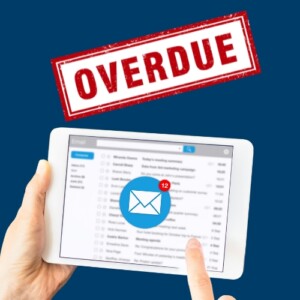With business insolvencies rising at record levels and so many more companies struggling with cashflow problems it has never been more important for SMEs to have robust and precise credit control practices.

Top tips from Tony Cross, Growth Hub Business Champion
Safeguarding Your Business
Here we examine 4 simple steps to making sure you are not going to be harmed through late or non-payment of your invoices:
1) Start Early
Whenever you discuss your pricing or charges always include your payment terms. When do you expect to be paid in full, consider asking for payment upfront or for a deposit where there is cost or early stage work involved, and add these terms to your contract that the buyer signs or acknowledges ahead of work commencing. Ask yourself how much you know about your customer, what is their credit worthiness, current status or likely financial position?

Use approved accounting software
2) Prepare Invoices Correctly
Here it can be useful to use approved accounting software that your customers can recognise clearly and provides all the necessary information. Check first who to send it to, since often it will go unpaid because it hasn’t reached the right person. Good software will also automate reminders for you, ideally from 48 hrs after payment is due.
3) Follow-up Consistently

Follow up after 7 days
Use an email that is courteous and friendly from 7 days after the payment due date. Follow this up with a call 7 days later if no response is received. Here it is important to consider what is really holding the payment up. Try to understand their position, but then seek a firm date by when the money will be received, and be assertive about this.
At 60 days late you will have made a number of calls and emails and should consider stronger action. The Government website shows what can be charged as late payment interest, but this is only likely to be a minor deterrent.
The Small Claims Court, debt collection agencies or a solicitors letter citing legal action could well be necessary.
4) Be creative
Think about what the experience of late payment tells you. Are clients fully satisfied with your product or service? Are they simply experiencing difficulties of their own, or should you change your payment terms. Consider withdrawing your services until matters are resolved with regular customers. Would an in person meeting help to resolve matters? Seek outside help —here you can contact the Small Business Commissioner over disputes or gain free advice from your local Growth Hub.
